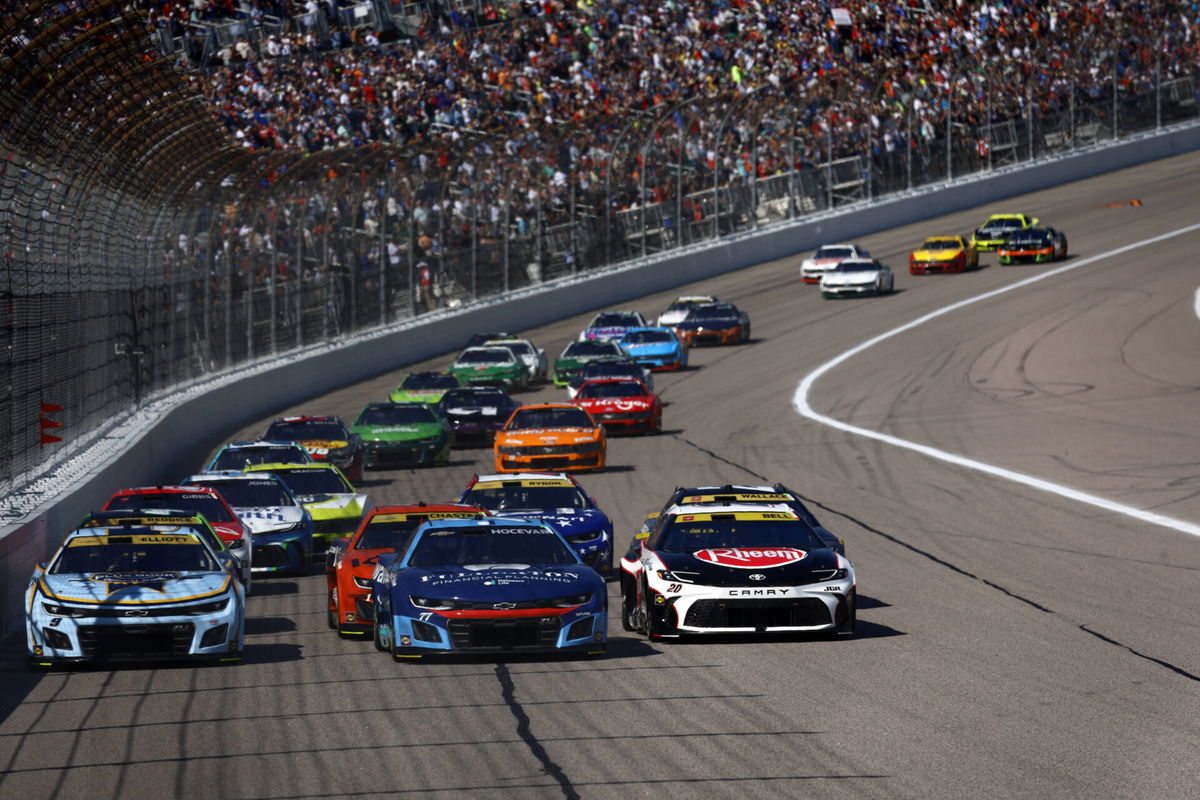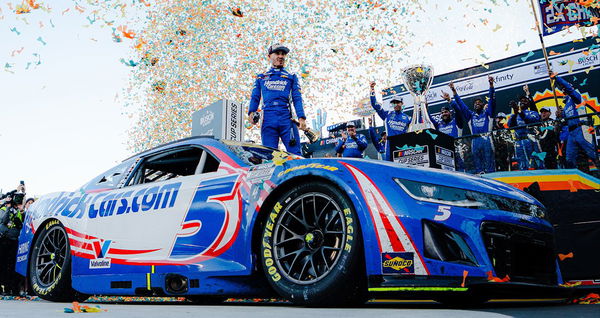
Imago
September 28, 2025, Kansas City, Ks, USA: CARSON HOCEVAR 77 of Portage, MI battles for position for the Hollywood Casino 400 Presented by ESPN BET in Kansas City, KS. Kansas City USA – ZUMAa161 20250928_aaa_a161_006 Copyright: xWalterxG.xArcexSr.x

Imago
September 28, 2025, Kansas City, Ks, USA: CARSON HOCEVAR 77 of Portage, MI battles for position for the Hollywood Casino 400 Presented by ESPN BET in Kansas City, KS. Kansas City USA – ZUMAa161 20250928_aaa_a161_006 Copyright: xWalterxG.xArcexSr.x

Imago
September 28, 2025, Kansas City, Ks, USA: CARSON HOCEVAR 77 of Portage, MI battles for position for the Hollywood Casino 400 Presented by ESPN BET in Kansas City, KS. Kansas City USA – ZUMAa161 20250928_aaa_a161_006 Copyright: xWalterxG.xArcexSr.x

Imago
September 28, 2025, Kansas City, Ks, USA: CARSON HOCEVAR 77 of Portage, MI battles for position for the Hollywood Casino 400 Presented by ESPN BET in Kansas City, KS. Kansas City USA – ZUMAa161 20250928_aaa_a161_006 Copyright: xWalterxG.xArcexSr.x
“I don’t want the next Christopher Bell, who is ten years old right now, thinking about NASCAR, wanting to go to NASCAR, wanting to be a champion, and say, ‘huh, this is a little bit more of a chance on a one race, right?’” O’Donnell said recently, hinting at what many believe is now inevitable. It’s been a long time coming, and everyone in NASCAR knows it. Drivers have spoken up. Fans have sounded off. Even executives can’t ignore it anymore. The playoff format, once hailed as bold and exciting, is now the center of growing frustration. And if you ask NASCAR President Steve O’Donnell, the sport can’t afford to keep letting championships hinge on a single, do-or-die race.
Watch What’s Trending Now!
Behind closed doors, the playoff committee has been meeting for months. The discussions are done. A decision is near. And according to one insider, what comes next could rewrite the modern era of NASCAR forever.
Jordan Bianchi explains the roads NASCAR can take
On the latest episode of the Lights Out podcast, Jordan Bianchi didn’t mince words when talking about the change coming to the NASCAR playoffs next year. “There is 100% a change coming to the playoff format. There will be a big change to the playoff format. Now, what that change is going to be exactly is up in the air,” he said.
As per Bianchi, three ideas are currently on the table, each radically different in philosophy, purpose, and impact. The first is “a season-long full 36 race championship.” This is the most traditional and the most familiar to longtime fans. Simply put: whoever scores the most points over every race of the season wins the title. No eliminations, no resets, no winner-take-all chaos. Formula 1 and IndyCar still use this system, and NASCAR itself lived by it for decades. It rewards consistency, durability, and domination over the long haul.
Then, as Bianchi revealed, “There’s also a heavy discussion centered around the 10 race chase.” This format sits somewhere between the past and present. Drivers race the full season, but only the top 10 or 12 are eligible for the championship over the final 10 races. The twist is that there are no eliminations. Points accumulate straight through to the end. It preserves the pressure of the NASCAR playoff, without the “must-win” chaos that can derail a multi-win driver’s season over one bad race. Denny Hamlin and Connor Zilisch will definitely love this!

The third is the 3-3-4 format. This is the most modern of the three. This proposal keeps rounds of the current NASCAR playoff system: 3 races, 3 races, then 4, with eliminations along the way. But unlike today, the champion wouldn’t be decided in a single event. Instead, the final four-race stretch decides it. The driver with the most points across that mini-season takes the crown.
Finally, Bianchi summed it up, “I can promise you that it’s going to change. It’s just a matter of how it’s going to change.”
Meanwhile, Hamlin says the NASCAR playoff is here to stay
Denny Hamlin has spoken candidly about the NASCAR playoff format amid ongoing criticism, firmly stating that the playoffs are here to stay despite calls for change. After a heartbreaking 2025 season in which he came close to his first championship but lost at Phoenix due to a late caution and race restart, Hamlin shared his frustrations with how the current system can penalize dominant performances for the sake of entertainment.
He highlighted that while drivers like himself, William Byron, Kyle Larson, and others advocate for a larger sample size to decide the champion, NASCAR’s clear direction is to maintain the playoff format. Hamlin explained that a full-season points-based championship, like those popularized in NASCAR’s earlier decades, is unlikely to return.
Everyone get over it, you’re going to get playoffs,” he said bluntly on his Actions Detrimental podcast. Hamlin emphasized the unfairness drivers face when a season’s dominance can be undone in a single race due to late-race cautions or strategic calls, but acknowledged that the playoffs inject unique “drama” and “intensity” into the sport.
Despite his disappointment, Hamlin gave credit to Kyle Larson, calling him a deserving champion who “played the game as it was meant to be played” by adapting to the final race situation. The debate over the playoff format continues to divide fans and drivers, with some nostalgic for the older formats and others accepting the thrill the playoffs bring.
Hamlin’s comments reveal a sport at a crossroads, balancing tradition with entertainment demands while keeping drivers motivated and fans engaged. As NASCAR prepares for potential tweaks in 2026’s playoff structure, Hamlin remains realistic but hopeful, focused on racing hard despite the system’s flaws. His perspective is a powerful reminder of the complexities in crowning a champion in modern NASCAR.


